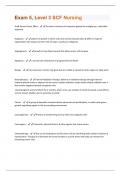Exam (elaborations)
Exam 5, Level 3 SCF Nursing Questions and Answers 100% Verified
- Course
- Institution
Graft-Verses-Tumor Effect - the donor immune cell response against the malignancy; a desirable response Anaplasia - pattern of growth in which cells lack normal characteristics & differ in shape & organization with respect to their cells of origin; usually are malignant Angiogenesis - growth of...
[Show more]



